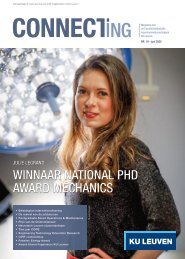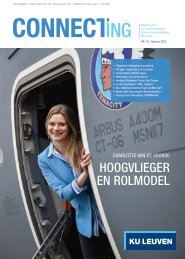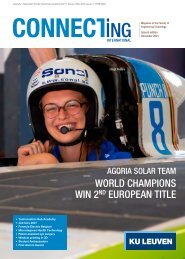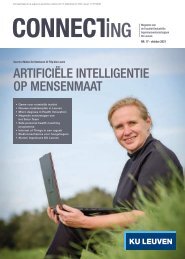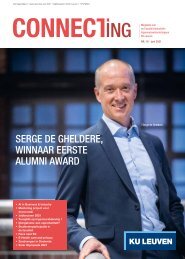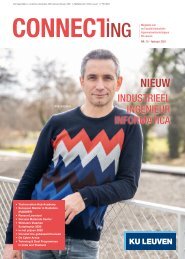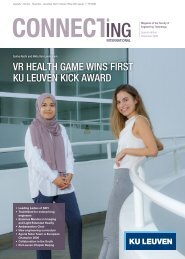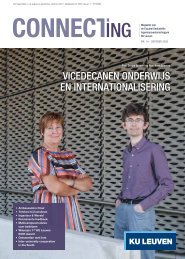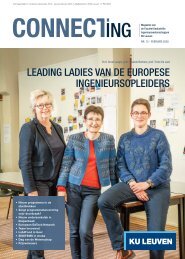ConnectING 13
Create successful ePaper yourself
Turn your PDF publications into a flip-book with our unique Google optimized e-Paper software.
ONDERZOEK IN DE KIJKER<br />
INDUSTRY OR ACADEMIA?<br />
THE ANSWER IS BOTH<br />
Every year, Flanders Innovation & Entrepreneurship (VLAIO- Vlaams<br />
Agentschap Innoveren en Ondernemen) provides funding for doctoral and postdoctoral<br />
research in close collaboration with a Flemish company. In 2019, thirty<br />
Baekeland-mandates (PhD) were submitted in collaboration with an academic<br />
promotor from KU Leuven. Nineteen projects were approved amounting to a<br />
success rate of 63%. We caught up with André Carlos Munoz Lopez (Ghent<br />
Technology Campus), current Baekeland mandate –holder.<br />
Could you introduce your research project?<br />
After an initial pre-doctoral phase at the KU Leuven research<br />
group, BioTeC+, I am now in my second year of PhD supported<br />
by a Baekeland mandate from VLAIO. The project plan was<br />
developed during that pre-doctoral phase and successfully<br />
defended in front of a mixed academia-industry jury. The scope<br />
of my research falls within the framework of Industry 4.0. It aims<br />
at developing novel methods for data-driven modelling, control,<br />
and optimization of chemical production processes. I use data that<br />
is continuously generated at the production sites of Janssen<br />
Pharmaceutica (Johnson & Johnson) to construct mathematical<br />
models for a better understanding, controlling and optimizing their<br />
processes. My PhD research contributes to a more efficient<br />
production of medicines to meet the volumes required for the<br />
patients but also, and more importantly, to the quality standards<br />
of those medicines.<br />
What was your motivation to collaborate with a company?<br />
As a student finishing my studies in chemical engineering, I was<br />
intrigued by science and research. Having the opportunity to<br />
contribute to novel ideas and developments to the understanding<br />
of a given phenomenon, and building new possibilities to exploit<br />
that understanding to improve human life, is something that<br />
attracts many young students. But as a rather practical person,<br />
with a strong feeling for engineering, I was also aware that<br />
transformations do not occur from one moment to the next by<br />
themselves. Someone needs to put the effort in bringing powerful<br />
ideas and technologies to practice in order to demonstrate their<br />
benefits and limitations in the real world. I am quite sure that<br />
many others before and after me, had and will face the same<br />
question: Industry or Academia? Well, with this Baekeland<br />
mandate, the answer is both.<br />
Which type of work do you perform at which location?<br />
What I love about the Baekeland formula is that, today, I share an<br />
office with my colleagues from KU Leuven –BioTeC+: an<br />
internationally recognized research group at Ghent Technology<br />
Campus, founded by Professor Jan Van Impe and with over 25<br />
years of research experience in model-based design, monitoring,<br />
optimization, and control of (bio)chemical conversion processes.<br />
Tomorrow, I will sit at my desk at Janssen Pharmaceutica, the<br />
largest pharmaceutical company in Belgium. With my colleagues at<br />
the university, I have the opportunity to discuss fundamental topics<br />
related to process modelling, monitoring and optimisation, while<br />
with my colleagues from industry I contribute to the continuous<br />
improvement of production processes to bring medicines to the<br />
patients.<br />
What will be the tangible outcomes from your research?<br />
Towards the end of my PhD, my goal is to have developed novel<br />
and broadly applicable approaches for data-driven modelling of<br />
(bio) chemical production processes. These will have been validated<br />
directly on the production of medicines and will have resulted in<br />
significant improvements that guarantee meeting the stringent<br />
quality standards. Meanwhile, I have already obtained significant<br />
progress in this direction. For example, I have developed a new<br />
method to train tensor-based models that result in more informative<br />
models that allow a more robust identification and factorization of<br />
the system variability. The more interpretable data-driven models<br />
help engineers to identify the root cause for deviations, monitor the<br />
processes and offers the opportunity for continuous improvement<br />
of these processes. The application of this methodology to a largescale<br />
spray-drying unit used in the commercial production of an<br />
Active Pharmaceutical Ingredient has resulted in a benefit to<br />
Janssen Pharmaceutical in fault identification and quality prediction.<br />
Similar applications in other production lines are currently ongoing,<br />
with objectives such as process optimisation and real time release.<br />
Iason Passaris<br />
www.vlaio.be/nl/subsidies-financiering/<br />
baekeland-mandaten<br />
30




